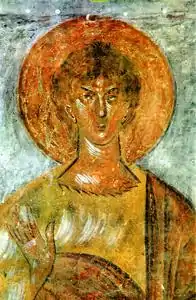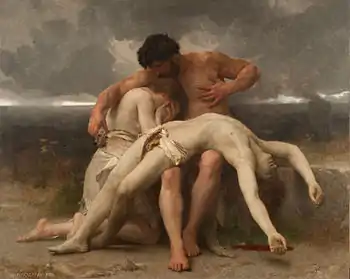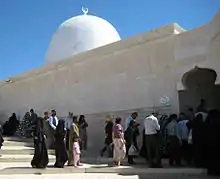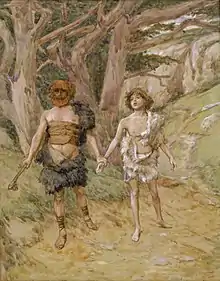Abel
Abel[lower-alpha 1] is a Biblical figure in the Book of Genesis within Abrahamic religions. He is the younger brother of Cain, and the younger son of Adam and Eve, the first couple within the Biblical tale.[1] He was a shepherd who offered his firstborn flock up to God as an offering. God accepted his offering but not his brother’s. Cain then killed Abel out of jealousy.
Abel | |
|---|---|
 Icon of Abel by Theophanes the Greek | |
| Parent(s) | Adam and Eve |
| Relatives | In Genesis: Cain (sibling) Seth (sibling) According to later traditions: Aclima (sibling) Awan (sibling) Azura (sibling) |
According to Genesis, this was the first murder in the history of mankind.
Genesis narrative
Interpretations
Jewish and Christian interpretations
According to the narrative in Genesis, Abel (Hebrew: הֶבֶל Héḇel, in pausa הָבֶל Hā́ḇel; Greek: Ἅβελ Hábel; Arabic: هابيل, Hābīl) is Eve's second son. His name in Hebrew is composed of the same three consonants as a root meaning "breath". Julius Wellhausen, have proposed that the name is independent of the root.[2] Eberhard Schrader had previously put forward the Akkadian (Old Assyrian dialect) ablu ("son") as a more likely etymology.[3]

In Christianity, comparisons are sometimes made between the death of Abel and that of Jesus, the former thus seen as being the first martyr. In Matthew 23:35 Jesus speaks of Abel as "righteous", and the Epistle to the Hebrews states that "The blood of sprinkling ... [speaks] better things than that of Abel" (Hebrews 12:24). The blood of Jesus is interpreted as bringing mercy; but that of Abel as demanding vengeance (hence the curse and mark).[4]
Abel is invoked in the litany for the dying in the Roman Catholic Church, and his sacrifice is mentioned in the Canon of the Mass along with those of Abraham and Melchizedek. The Alexandrian Rite commemorates him with a feast day on December 28.[5]
According to the Coptic Book of Adam and Eve (at 2:1–15), and the Syriac Cave of Treasures, Abel's body, after many days of mourning, was placed in the Cave of Treasures, before which Adam and Eve, and descendants, offered their prayers. In addition, the Sethite line of the Generations of Adam swear by Abel's blood to segregate themselves from the unrighteous.
In the Book of Enoch (22:7), regarded by most Christian and Jewish traditions as extra-biblical, the soul of Abel is described as having been appointed as the chief of martyrs, crying for vengeance, for the destruction of the seed of Cain. This view is later repeated in the Testament of Abraham (A:13 / B:11), where Abel has been raised to the position as the judge of the souls.
Islamic interpretation


According to Shi'a Muslim belief, Abel ("Habeel") is buried in the Nabi Habeel Mosque, located on the west mountains of Damascus, near the Zabadani Valley, overlooking the villages of the Barada river (Wadi Barada), in Syria. Shi'a are frequent visitors of this mosque for ziyarat. The mosque was built by Ottoman Wali Ahmad Pasha in 1599.[6]
Notes
References
- The Holy Bible (English Standard Version ed.). Crossway Bibles. 2016. pp. Genesis 1:26–27, Genesis 2:20–24.
- Julius Wellhausen, Skizzen und Vorarbeiten, volume 3, (1887), p. 70.
- Eberhard Schrader, Die Keilinschrift und das Alte Testament, 1872.
- For copies of a spectrum of notable translations and commentaries see Hebrews 12:24 at the Online Parallel Bible.
- Holweck, F. G., A Biographical Dictionary of the Saints. St. Louis, MO: B. Herder Book Co., 1924.
- Russell, Jesse; Cohn, Ronald (2012). Nabi Habeel Mosque. Book on Demand. p. 174. ISBN 978-5512000984.
